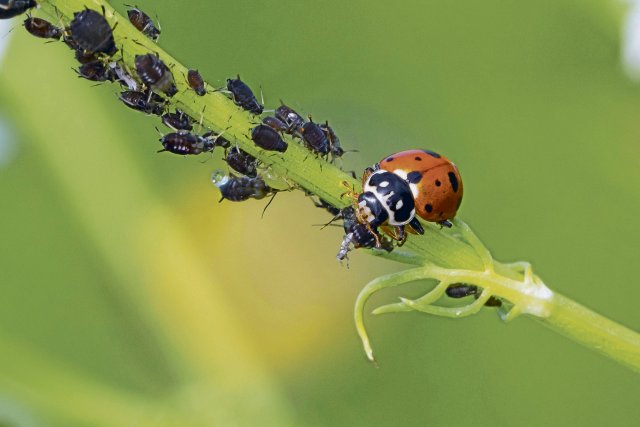Beneficial insects can be used to specifically combat harmful insects.
Photo: imago/blickwinkel
Pesticides are an important cause of biodiversity and habitat loss in intensively managed agricultural landscapes. Agrochemicals have a lethal effect on many insects, including important pollinators such as bees and bumblebees, as well as organisms in soil and water. Nevertheless, the sale of pesticides has not declined for years: around 30,000 tons of active ingredients or around 90,000 tons of crop protection products are applied every year. Further agrochemical inputs in agriculture must be avoided if natural insect diversity is to survive.
An alternative is biological plant protection, in which beneficial insects are used, for example parasitic wasps or lacewings against aphids or predatory mites against spider mites. Such beneficial organisms have already been successfully used in greenhouse crops. However, biological processes are difficult to implement in the field, which is why synthetic insecticides are usually used.
The “beneficial insect rolling meadow” could now change that. The rolling meadow was developed by the Stuttgart-Hohenheim State School of Horticulture and Hermann Welzel Gartenbau GbR based on the model of a flexible rolled turf. The aim is to minimize harmful organisms on outdoor vegetable crops – in this case for lettuce and kohlrabi – at an early stage by spreading beneficial organisms. And it works like this: For pests that most often attack the lettuce, suitable opponents are established in the optimal development stage on a rolling meadow on which suitable food plants have already been sown before it is rolled out at the right time.
The system is supplemented by a specially developed process for sowing, growing, packaging, transporting and spreading the lawn.
Around 80 funded projects
This is one of around 80 projects in the “Avoidance and Reduction of Pesticides in the Environment” funding initiative, which has been funded by the German Federal Environmental Foundation (DBU) since 2020. Projects funded so far were presented at a conference in December. The aim of the initiative is to reduce or, better yet, avoid pesticide residues in the environment. Small and medium-sized companies and their collaborations with research institutions were able to promote innovative ideas for ecological plant protection measures.
Beneficial insects can also be attracted by tailor-made flower strips. In order to keep the crops healthy and suppress weeds, wild herb mixtures are specifically sown between the rows of cultivated plants. Mechanical chopping and care techniques with precise guidance were developed specifically for this purpose. The project can also increase biodiversity in conventional agriculture.
Insecticides are particularly often used in fruit growing. Phytoplasmoses, which are transmitted by psyllids, are spreading more and more often in orchards. The actual pathogens are phytoplasmas – a group of bacteria. The plant diseases they cause reduce the quality of the fruit or even cause the trees to die.
Some species of psyllids overwinter on coniferous trees, whose conifer scents have a repellent effect on insects in spring. In organic pear cultivation, kaolin is also used as an antidote, a white rock powder that leaves a white film on the trees. The tiny feet of the insects slip on the slippery clay minerals so that they cannot hold on to the leaves.
The disadvantage is that the film is not rainproof. This is where a DBU-funded project comes in, in which a spray-on, rainproof film was developed that is based on various clay materials. To increase the repellent effect, the film should be mixed with a coniferous fragrance. The spray solution is intended to keep aphids away and prevent the transmission of phytoplasmas. It is still being investigated how the solution remains biologically effective without having a negative impact on the environment. The aim is to create an effective spray film that is approved for use.
Accurately targets cherry vinegar flies
Another harmful insect is the cherry vinegar fly, which migrated from Southeast Asia. It attacks ripe soft fruit, such as cherries, plums and berries, and can lead to total failure of the entire cherry harvest in a short period of time. It usually becomes a problem just before harvest. A decision often has to be made at short notice whether to harvest earlier or whether to use pesticides. In order to make the right decision here, the infestation pressure would have to be determined beforehand. To date, an efficient and environmentally friendly method has been missing.
The Rhine-Palatinate Rural Area Service Center worked with two companies to develop a special monitoring trap for this purpose: to the so-called cup traps previously used, they added a sensor system that evaluates the amount of insects caught. Fruit growers and winegrowers receive data on current local insect pollution in real time via an app. Based on the current fly population in conjunction with the weather forecasts up to the time of harvest, cherry growers can then decide on a case-by-case basis whether to apply insecticides or not.
The funding initiative, which was launched four years ago and has now been completed, aimed to replace chemical pesticides with mechanical, thermal and optical methods or with biological alternatives. At the same time, preventive measures such as long crop rotations or breaks in cultivation should reduce the infestation of harmful organisms. Determined damage thresholds should take biodiversity criteria into account. It was also about promoting beneficial organisms and avoiding pesticide inputs into protected areas.
